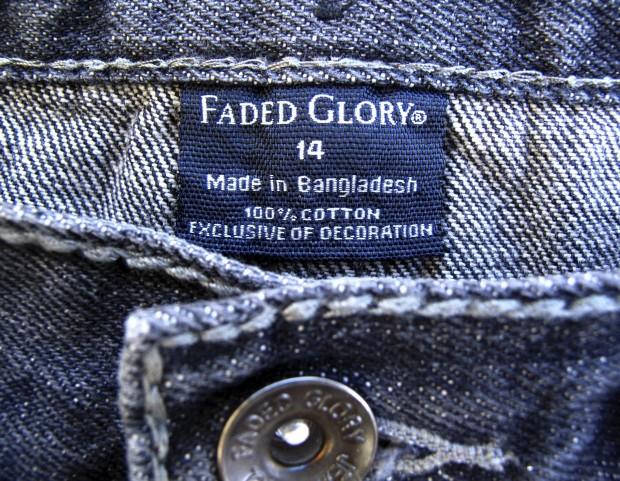US Ends Trade Privileges to Bangladesh Following Garment Factory Disasters
The clothing tag on a pair of jeans by Wal-Mart’s brand Faded Glory, which is made in Bangladesh, is shown after purchase from a Walmart store in Encinitas, California, May 14, 2013. Wal-Mart Stores Inc said on Tuesday that it would conduct in-depth safety inspections at all 279 Bangladesh factories with which it works and publicly release the names and inspection information, as pressure mounts on retailers to ensure worker safety after April’s deadly building collapse.
President Barack Obama announced Thursday that the US will end trade privileges with Bangladesh over concerns for safety and working conditions in factories.
The US will suspend Bangladesh from the Generalized System of Preferences (GSP), which will increase tariffs on certain goods. The move, in response to recent garment factory disasters, will not directly affect the garment industry because they were not eligible for duty cuts under GSP.
The collapse of a Rana Plaza garment factory outside Dhaka on April 24 left over 1,100 people dead. A factory fire in November 2012 killed over 100 people.
Robert J. Ross, a labor rights scholar at Clark University in Massachusetts and author of “Slaves to Fashion: Poverty and abuse in the new sweatshops,” says that the suspension is a strong statement.
“The symbolism of the US government saying that Bangladesh’s labor practices are unworthy of concessionary treatment is a powerful message to the US retailers who have failed to respond to the global surge to cooperate in improving the labor conditions environment there – and to the Bangladesh government which has been lax in protecting universally accepted labor rights of association,” Ross wrote in an email.
Ross says the suspension is also a response to the Bangladeshi government’s handling of the 2012 assassination of trade union leader Aminul Islam. There have been no arrests in the case.
Brian Campbell, director of policy and legal programs at the International Labor Rights Forum, agreed that while the economic impact on the garment industry is minimal – the privileges largely affect Bangladesh’s tobacco industry – the action by the US government is “a strong message that there is symbolic support of workers’ rights.”
“It is a recognition of the relationship between the [Bangladesh] government and the garment industry,” Campbell said in a phone interview.
The Rana Plaza disaster reignited calls for retailers and brands to sign on to the Bangladesh Accord on Factory and Building Safety, which includes measures such as independent safety inspections and public reports, an increased role for workers and unions, and funding for repairs and renovations.
European retailers, including H&M, Inditex, C&A, Primark, Tesco, Benetton and Mango, led the way in signing the accord in the weeks after the collapse. US company PVH (which owns Tommy Hilfiger and Calvin Klein) and German retailer Tchibo agreed to sign the accord last year.
Other US retailers such as Walmart and Gap, have not signed the agreement. This week, they released their own pact that sets up a fund to upgrade Bangladeshi factories, but limits companies’ legal liability for their safety.
“The suspension of trade benefits is primarily aimed as a penalty against the country, rather than at the corporations and brands driving the garment industry,” Stephanie Luce, professor of labor studies at the City University of New York and author of Fighting for a Living Wage,” wrote in an email.
Luce suggests that the US has at times used trade sanctions or policies in a harmful way, and that these latest moves “may only hurt in terms of building trust between workers and organizers in Bangladesh and the US.”
Mushfiq Mobarak, associate professor of economics at the Yale School of Management, says that this action could be harmful to Bangladeshi garment workers. The European Union is reconsidering its own GSP privileges to Bangladesh, which includes 60 percent of Bangladesh’s garment exports; if they follow the US’s lead, workers could lose their jobs, Mobarak says.
This kind of pressure, however, is precisely what is needed to produce change in Bangladesh’s labor laws and enforcement, according to Jeffery Hermanson, coordinator of the International Union League for Brand Responsibility
“It’s unfortunate that it’s come to this, but something must be done. This is the only leverage it seems that the government of Bangladesh will listen to,” he said in a phone interview.
Stephanie Luce says that a better solution is for US retailers to sign the Accord on Factory and Building Safety. A coordinated effort run by an independent party, she says, would be a better path to improve working conditions.
In a chat on Facebook hosted by The World in May, Ross said that companies had signed up to the Accord was “unprecedented.”
